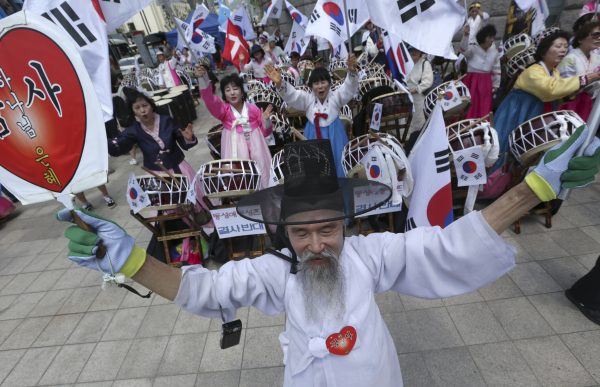The increased prominence of formations like the CLP signals a new chapter in religiously charged political homophobia in South Korea.
The CLP has not been alone in injecting explicitly anti-gay political rhetoric into public discourse. The chairman of the conservative Saenuri party, Kim Moo-sung, has repeatedly described homosexuality as ‘an outrage against humanity’. At a Christian political meeting in February 2016, Minjoo Party leader Park Young-sun referred to lesbian, gay, bisexual, transgender and queer (LGBTQ) rights as ‘against nature and against God’. She also vowed to oppose any legislation that would protect minorities from discrimination on the basis of sexual orientation or gender identity in employment, housing or healthcare.
Both Kim and Park ranked in the top three in the 22 worst homophobic offenders list compiled by Rainbow Vote, a public education campaign formed to expose politicians with a record of contempt for LGBTQ equality.
There are several key policy areas around LGBTQ equality in South Korea. All involve uphill battles and all provide rich opportunities for coalition-building. One key concern is the prohibition of homosexual conduct in the military, the only instance in which homosexuality is criminalised in South Korean law. LGBTQ activists and legal advocates have called for the repeal of the infamous Article 92 (6) of South Korea’s military criminal law that prohibits and punishes sex acts between men even when there is mutual consent. This article is applied broadly not only to criminalise homosexual acts but also to pathologise conduct, appearance and identities that are perceived to be non-normative.
The provision has been documented as being enforced on mere hearsay and allegations, and has been used flagrantly to penalise and isolate sexual minority conscripts who already face verbal and physical abuse. Within the system of mandatory male conscription in South Korea, gay men face enormous difficulties in fulfilling their military service obligations safely and with dignity. Several South Korean men have even successfully gained political asylum status in Canada and France, where their fear of homophobic violence and human rights violations during military service were determined to be credible and probable.
At a judicial level, there remains no meaningful and enforceable national anti-discrimination legislation that would extend basic human rights protection to LGBTQ communities in South Korea. Homophobia is a public health issue. People living with HIV/AIDS in South Korea today cannot count on queer-positive medical or hospice care, and face devastating stigma and life-threatening denials of service by medical professionals.
Earlier attempts in 2007 and 2013 to introduce anti-discrimination legislation in the National Assembly were foiled, in large part by conservative Protestant opposition. Similarly, in December 2014, Protestant groups pressured the mayor of Seoul, Park Won-soon — a former human rights attorney and pro-democracy activist — to withdraw his support for LGBTQ rights and refuse to proclaim the Seoul Charter of Human Rights. Outraged by the mayor’s betrayal, hundreds of queer activists and progressive allies from labour and feminist groups occupied Seoul City Hall over six days — an unprecedented political action that demonstrated the growing significance of coalitional solidarity in contemporary LGBTQ activism and minority politics.
Conservative Protestant forces have been particularly unkind to minorities — sexual minorities, immigrants and temporary migrants who constitute religious and ethnic minorities in South Korea, and trade unionists, dissidents and social justice activists who compose formidable political minorities. Conservative Protestants and homophobic political leaders have even linked LGBTQ equality with terrorism and radical Islam, as can be seen in the recent CLP slogans of ‘No to homosexuality, no to Islam, no to anti-Christianity’, all in the name of national security. Some have gone as far as to call for a stop to immigration from Muslim-majority countries such as Pakistan and Bangladesh. In their extreme and most troubling formations, homophobia is combined with Islamophobia and xenophobia to bring hatred and bigotry to new heights.
In June 2016 the annual Korea Queer Culture Festival (KQCF) in Seoul will celebrate its 17th year. What first began as a small-scale event with 50 or so participants has now grown to a spectacular festival with more than 10,000 participants and dozens of cultural and political groups that will gather at Seoul Square, in the heart of the city. But increased LGBTQ visibility has also resulted in more public detractors and violent hecklers. In recent years both the queer festival and street parade have been disrupted by anti-gay protesters who have thrown feces at festival-goers, blocked the parade procession and blasted amplified epithets from outside the festival zone. The 2016 KQCF participants will have to contend with groups that have registered to use Seoul Square for anti-LGBTQ events in the days leading up to the annual queer festival. Homophobia is certainly a public safety issue.
Contention over the queer festival is not simply a struggle over public space. It is a struggle over the public character of that space and the very meaning of a democratic public sphere. It is remarkable that after the spirited slogan in 2015, ‘Love, Resist, Queer Revolution’, the 2016 KQCF slogan is simply ‘Queer I am’. LGBTQ politics in South Korea has come full circle to a sobering and modest demand: an insistence on the fundamental right to be.
Ju Hui Judy Han is Assistant Professor in the Department of Geography and Planning at the University of Toronto.
This article appeared in the most recent edition of the East Asia Forum Quarterly, ‘Gender and sexuality’.

